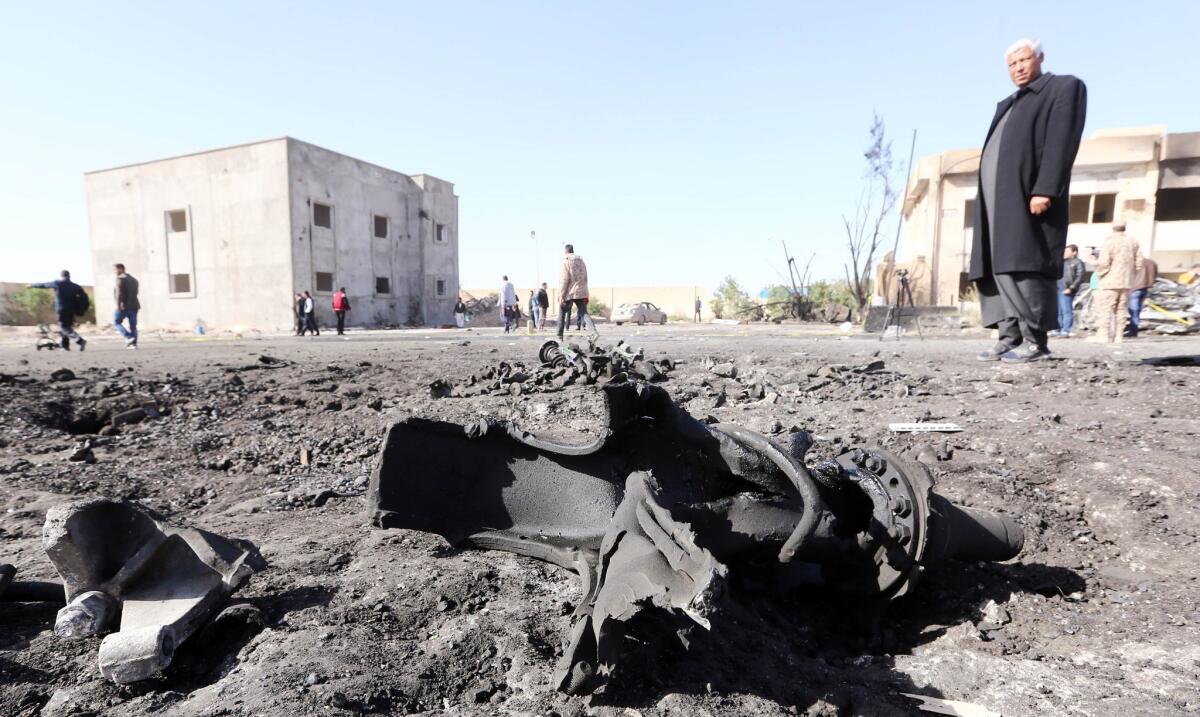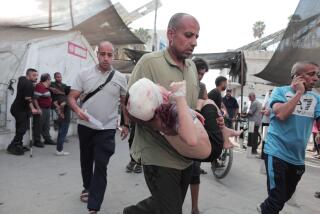Truck bomb targeting Libya police facility kills at least 60

Libyans inspect the site of a suicide truck bombing on a police school in Libya’s coastal city of Zlitan on Jan. 7.
- Share via
reporting from cairo — At least 60 people were killed and dozens injured Thursday when a truck bomb exploded at a police training center in the Libyan coastal town of Zlitan, officials said.
The attack occurred in an area where an affiliate of the militant group Islamic State has reportedly tried to gain ground as it spreads westward from the city of Surt. A truck filled with explosives was driven into the training center Thursday morning, an unnamed security source in Zlitan was quoted as saying by the pan-Arab news channel Al Arabiya.
Hospitals in Zlitan and Tripoli, the Libyan capital, and nearby towns announced a state of emergency as the official news agency LANA called for blood donations to help victims of the bombing victims.
See more of our top stories on Facebook >>
Hours after the blast, rescue crews had recovered 60 bodies from the wreckage, said a hospital spokesman, Moammar Kaddi, the Associated Press reported. Libyan officials said they believed there might be dozens more dead.
Martin Kobler, the United Nations’ special envoy to the deeply divided country, called on Libyans to unite against the threats of terrorism.
“I condemn in the strongest terms today’s deadly suicide attack” in Zlitan, Kobler said in a Twitter message.
Aamaq, an Islamic State-affiliated media group, announced that the militants were behind the attack, but the extremist group did not immediately issue any formal statements about the bombing.
Islamic State has been entrenched in Libya since September 2014, when a number of Libyans who fought for Islamic State in Syria returned to join forces with other extremist militias that had pledged alliance to leader Abu Bakr Baghdadi.
The group took over the cities of Surt, Misurata and Derna as it sought to control a number of oil sources in the area. It seeks to take over more cities and oil wells for funding, as it has in other areas it controls in Iraq.
Apart from facing sporadic resistance from liberal or other moderate Islamic militias, Islamic State has widely exploited the lack of stability and the political and religious divisions in Libya since the fall of leader Moammar Kadafi in 2011.
The North African country has been split between an internationally recognized government based in the eastern city of Tobruk and its rival, the Islamist-led General National Congress headquartered in Tripoli, in the west.
The GNC was elected in 2012. However, parliamentary elections in the summer of 2014 ended with liberals securing a majority of the votes, prompting the GNC’s refusal to hand power to the elected assembly.
Empowered by Islamist militias that helped oust Kadafi’s government, the GNC subtly fought the newly elected parliament, backed by liberal rogue army Gen. Khalifa Haftar, who took on Islamists in May 2014.
Even as it endorsed the Tobruk-based parliament, the United Nations oversaw months of negotiations to bring both parties to an agreement on a national unity government.
A U.N.-brokered agreement was signed last month in Morocco with mid-January as a deadline for handing power to the new Cabinet. But differences remain, and whether the agreement will take hold remains unclear.
Hassan is a special correspondent.
ALSO
Iran says Saudi strike hits embassy in Yemen; no damage seen
South Korea to resume anti-North broadcasts in response to nuclear test
Man with knife shot dead at Paris police station on Hebdo anniversary
More to Read
Sign up for Essential California
The most important California stories and recommendations in your inbox every morning.
You may occasionally receive promotional content from the Los Angeles Times.









